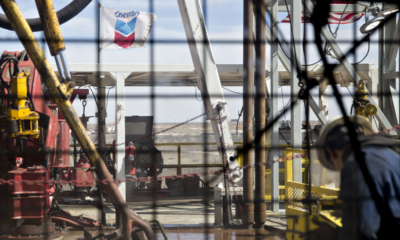Politics
Flashback: Harris compared ICE to KKK, said images of Border Patrol agents ‘evoked slavery’

Vice President Harris, both as senator and vice president, has caused controversy with Homeland Security agencies, comparing one to the Ku Klux Klan (KKK), and fueling a since-discredited narrative about Border Patrol agents on horseback allegedly whipping migrants.
ICE and KKK
At a November 2018 confirmation hearing, then-Sen. Harris asked Ronald Vitiello, who was former President Trump’s nominee to lead Immigration and Customs Enforcement (ICE), if he was “aware of the perception” of parallels between ICE and the KKK.
Harris had highlighted a tweet from Vitiello from 2015 in which he said the Democratic Party was comparable to a “neo-Klanist” entity. Vitiello apologized and admitted that those words were offensive.
FLASHBACK: HARRIS TRIED TO DEFUND BORDER PATROL AGENTS, SLASH ICE BUDGET
Vice President Harris (Leigh Vogel/Abaca/Bloomberg via Getty Images/File)
“What is the history that would then make those words wrong?” Harris asked, to which Vitiello said the KKK would be labeled as a domestic terrorist group by today’s standards and was motivated by race and ethnicity and tried to use “fear and force.”
“Are you aware of the perception of many about how the power and the discretion at ICE is being used to enforce the laws and do you see any parallels?” she asked.
Vitiello pushed back by saying, “I do not see any parallels” between the agency and the white supremacist group, and he asked whether she was asking him if the two were in the same category.
“No, I’m very specific about what I’m asking you. Are you aware of a perception that the way that they …” Harris went on before the nominee said, “I see none.”
“Are you aware that there is a perception that ICE is administering its power in a way that is causing fear and intimidation, particularly among immigrants and specifically among immigrants coming from Mexico and Central America?” she asked again.
Harris ended her questioning by asking whether Vitiello could lead the agency if he was not aware of the negative views toward it.
TRUMP EYES MULTIPLE BORDER VISITS AS HE DRAWS CONTRAST WITH ‘RADICAL LEFT’ HARRIS
“Sir, how can you be the head of an agency and be unaware of how your agency is perceived by certain communities?” she asked.
That sparked outrage at the time, with Republicans accusing her of making the comparison for political purposes.
“Kamala Harris is trying to launch her 2020 campaign off of comparing ICE officers to the KKK, and it’s absolutely disgusting,” then-Republican National Committee Chair Ronna McDaniel tweeted.
Border Patrol agents on horseback
Three years later, in 2021, Harris upset Border Patrol agents when she helped fuel a narrative about horseback agents who encountered migrants during the Haitian migrant surge in Del Rio, Texas.
Based on images of agents using their reins to control their horses, some Democrats, including President Biden, accused agents of whipping migrants. Harris did not explicitly mention whipping, but she did pile the pressure on the agents.
“What I saw depicted about those individuals on horseback treating human beings the way they were was horrible,” Harris told reporters. “And I fully support what is happening right now, which is a thorough investigation into exactly what is going on there. But human beings should never be treated that way. And I’m deeply troubled about it. And I’ll also be talking to [Homeland Security] Secretary [Alejandro] Mayorkas about it today.”
Her statement coincided with statements by Biden who promised “they will pay.” Days later, Harris said the images evoked slavery.
AXIOS HIT WITH COMMUNITY NOTE AFTER CLAIMING HARRIS WAS NEVER ‘BORDER CZAR’
Customs and Border Protection mounted officers attempt to contain migrants as they cross the Rio Grande from Ciudad Acuña, Mexico, into Del Rio, Texas, on Sept. 19, 2021. (AP Photo/Felix Marquez)
“Human beings should not be treated that way,” Harris told “The View” hosts. “It also invoked images of some of the worst moments of our history, where that kind of behavior has been used against the Indigenous people of our country, it has been used against African Americans during times of slavery.”
A subsequent investigation faulted the agents for minor infractions but found the underlying claims that migrants were whipped were not true. Mayorkas, who had criticized the agents, would later go on to defend them last year when a reporter would cite the incident.
“Well, let me just correct you right there because actually the investigation concluded that the whipping did not occur,” he said.
The comments from Harris also sparked outrage from Border Patrol agents at the time, who spoke to Fox News.
“Again, it is clear that those in charge, a term that is disgusting to use, have no clue about our operations and frankly operate by ignorance and unhinged emotions,” one said.
Harris, however, has not backed down from her remarks on either incident.
“The only ‘plan’ Donald Trump has to secure our border is ripping mothers from their children and a few xenophobic placards at the Republican National Convention,” Harris campaign spokesperson Kevin Munoz said in a statement on Monday. “He tanked the bipartisan border security deal because, for Donald Trump, this has never been about solutions just running on a problem. Like everything with Donald Trump, it’s never been about helping the country, it’s only about helping himself. There’s only one candidate in this race who will fight for bipartisan solutions to strengthen border security, and that’s Vice President Harris.”
Immigration will likely be a top priority for Harris if she is elected president, given the ongoing situation at the border. She was tasked with heading international diplomacy to deal with the migration crisis in 2021, which led to her being dubbed the “border czar” by Republicans and media outlets. Her campaign has said that, if elected, she will fight for solutions to strengthen the border. It has also taken aim at signs calling for mass deportations at the recent GOP convention.

Politics
Federal judge blocks Trump from cutting childcare funds to Democratic states over fraud concerns

NEWYou can now listen to Fox News articles!
A federal judge Friday temporarily blocked the Trump administration from stopping subsidies on childcare programs in five states, including Minnesota, amid allegations of fraud.
U.S. District Judge Arun Subramanian, a Biden appointee, didn’t rule on the legality of the funding freeze, but said the states had met the legal threshold to maintain the “status quo” on funding for at least two weeks while arguments continue.
On Tuesday, the U.S. Department of Health and Human Services (HHS) said it would withhold funds for programs in five Democratic states over fraud concerns.
The programs include the Child Care and Development Fund, the Temporary Assistance for Needy Families program, and the Social Services Block Grant, all of which help needy families.
USDA IMMEDIATELY SUSPENDS ALL FEDERAL FUNDING TO MINNESOTA AMID FRAUD INVESTIGATION
On Tuesday, the U.S. Department of Health and Human Services said it would withhold funds for programs in five Democratic states over fraud concerns. (AP Photo/Jose Luis Magana, File)
“Families who rely on childcare and family assistance programs deserve confidence that these resources are used lawfully and for their intended purpose,” HHS Deputy Secretary Jim O’Neill said in a statement on Tuesday.
The states, which include California, Colorado, Illinois, Minnesota and New York, argued in court filings that the federal government didn’t have the legal right to end the funds and that the new policy is creating “operational chaos” in the states.
U.S. District Judge Arun Subramanian at his nomination hearing in 2022. (Tom Williams/CQ-Roll Call, Inc via Getty Images)
In total, the states said they receive more than $10 billion in federal funding for the programs.
HHS said it had “reason to believe” that the programs were offering funds to people in the country illegally.
‘TIP OF THE ICEBERG’: SENATE REPUBLICANS PRESS GOV WALZ OVER MINNESOTA FRAUD SCANDAL
The table above shows the five states and their social safety net funding for various programs which are being withheld by the Trump administration over allegations of fraud. (AP Digital Embed)
New York Attorney General Letitia James, who is leading the lawsuit, called the ruling a “critical victory for families whose lives have been upended by this administration’s cruelty.”
New York Attorney General Letitia James, who is leading the lawsuit, called the ruling a “critical victory for families whose lives have been upended by this administration’s cruelty.” (Win McNamee/Getty Images)
CLICK HERE TO DOWNLOAD THE FOX NEWS APP
Fox News Digital has reached out to HHS for comment.
Politics
Washington National Opera is leaving the Kennedy Center in wake of Trump upset

In what might be the most decisive critique yet of President Trump’s remake of the Kennedy Center, the Washington National Opera’s board approved a resolution on Friday to leave the venue it has occupied since 1971.
“Today, the Washington National Opera announced its decision to seek an amicable early termination of its affiliation agreement with the Kennedy Center and resume operations as a fully independent nonprofit entity,” the company said in a statement to the Associated Press.
Roma Daravi, Kennedy Center’s vice president of public relations, described the relationship with Washington National Opera as “financially challenging.”
“After careful consideration, we have made the difficult decision to part ways with the WNO due to a financially challenging relationship,” Daravi said in a statement. “We believe this represents the best path forward for both organizations and enables us to make responsible choices that support the financial stability and long-term future of the Trump Kennedy Center.”
Kennedy Center President Ambassador Richard Grenell tweeted that the call was made by the Kennedy Center, writing that its leadership had “approached the Opera leadership last year with this idea and they began to be open to it.”
“Having an exclusive relationship has been extremely expensive and limiting in choice and variety,” Grenell wrote. “We have spent millions of dollars to support the Washington Opera’s exclusivity and yet they were still millions of dollars in the hole – and getting worse.”
WNO’s decision to vacate the Kennedy Center’s 2,364-seat Opera House comes amid a wave of artist cancellations that came after the venue’s board voted to rename the center the Donald J. Trump and the John F. Kennedy Memorial Center for the Performing Arts. New signage featuring Trump’s name went up on the building’s exterior just days after the vote while debate raged over whether an official name change could be made without congressional approval.
That same day, Rep. Joyce Beatty (D-Ohio) — an ex officio member of the board — wrote on social media that the vote was not unanimous and that she and others who might have voiced their dissent were muted on the call.
Grenell countered that ex officio members don’t get a vote.
Cancellations soon began to mount — as did Kennedy Center‘s rebukes against the artists who chose not to appear. Jazz drummer Chuck Redd pulled out of his annual Christmas Eve concert; jazz supergroup the Cookers nixed New Year’s Eve shows; New York-based Doug Varone and Dancers dropped out of April performances; and Grammy Award-winning banjo player Béla Fleck wrote on social media that he would no longer play at the venue in February.
WNO’s departure, however, represents a new level of artist defection. The company’s name is synonymous with the Kennedy Center and it has served as an artistic center of gravity for the complex since the building first opened.
Politics
AOC accuses Vance of believing ‘American people should be assassinated in the street’

NEWYou can now listen to Fox News articles!
Democratic Rep. Alexandria Ocasio-Cortez is leveling a stunning accusation at Vice President JD Vance amid the national furor over this week’s fatal shooting in Minnesota involving an ICE agent.
“I understand that Vice President Vance believes that shooting a young mother of three in the face three times is an acceptable America that he wants to live in, and I do not,” the four-term federal lawmaker from New York and progressive champion argued as she answered questions on Friday on Capitol Hill from Fox News and other news organizations.
Ocasio-Cortez spoke in the wake of Wednesday’s shooting death of 37-year-old Renee Nicole Good after she confronted ICE agents from inside her car in Minneapolis.
RENEE NICOLE GOOD PART OF ‘ICE WATCH’ GROUP, DHS SOURCES SAY
Members of law enforcement work the scene following a suspected shooting by an ICE agent during federal operations on January 7, 2026, in Minneapolis, Minnesota. (Stephen Maturen/Getty Images)
Video of the incident instantly went viral, and while Democrats have heavily criticized the shooting, the Trump administration is vocally defending the actions of the ICE agent.
HEAD HERE FOR LIVE FOX NEWS UPDATES ON THE ICE SHOOTING IN MINNESOTA
Vance, at a White House briefing on Thursday, charged that “this was an attack on federal law enforcement. This was an attack on law and order.”
“That woman was there to interfere with a legitimate law enforcement operation,” the vice president added. “The president stands with ICE, I stand with ICE, we stand with all of our law enforcement officers.”
And Vance claimed Good was “brainwashed” and suggested she was connected to a “broader, left-wing network.”
Federal sources told Fox News on Friday that Good, who was a mother of three, worked as a Minneapolis-based immigration activist serving as a member of “ICE Watch.”
CLICK HERE TO DOWNLOAD THE FOX NEWS APP
Ocasio-Cortez, in responding to Vance’s comments, said, “That is a fundamental difference between Vice President Vance and I. I do not believe that the American people should be assassinated in the street.”
But a spokesperson for the vice president, responding to Ocasio-Cortez’s accusation, told Fox News Digital, “On National Law Enforcement Appreciation Day, AOC made it clear she thinks that radical leftists should be able to mow down ICE officials in broad daylight. She should be ashamed of herself. The Vice President stands with ICE and the brave men and women of law enforcement, and so do the American people.”
-

 Detroit, MI7 days ago
Detroit, MI7 days ago2 hospitalized after shooting on Lodge Freeway in Detroit
-

 Technology4 days ago
Technology4 days agoPower bank feature creep is out of control
-

 Dallas, TX5 days ago
Dallas, TX5 days agoDefensive coordinator candidates who could improve Cowboys’ brutal secondary in 2026
-

 Dallas, TX2 days ago
Dallas, TX2 days agoAnti-ICE protest outside Dallas City Hall follows deadly shooting in Minneapolis
-

 Iowa4 days ago
Iowa4 days agoPat McAfee praises Audi Crooks, plays hype song for Iowa State star
-

 Health6 days ago
Health6 days agoViral New Year reset routine is helping people adopt healthier habits
-

 Nebraska3 days ago
Nebraska3 days agoOregon State LB transfer Dexter Foster commits to Nebraska
-

 Delaware1 day ago
Delaware1 day agoMERR responds to dead humpback whale washed up near Bethany Beach

















